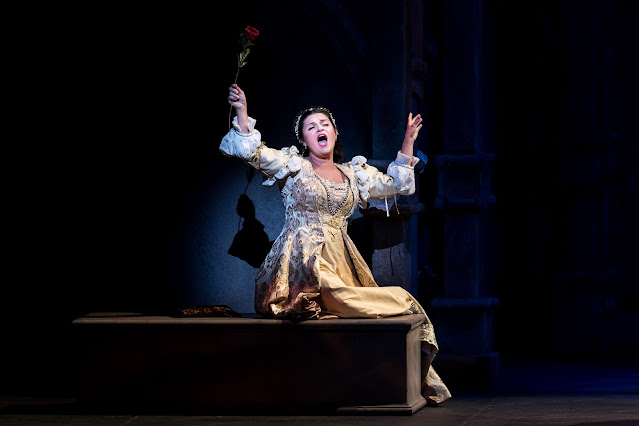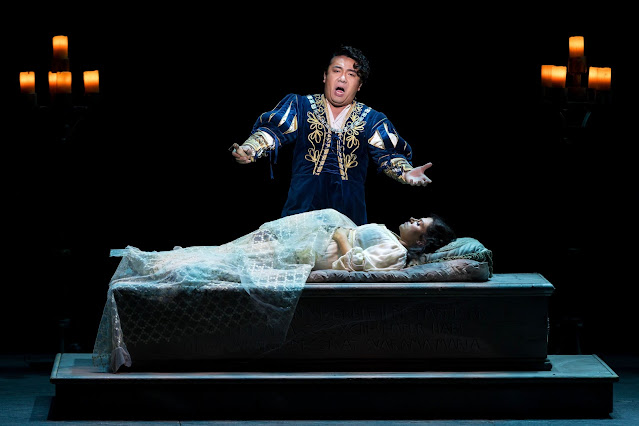 |
| Charles Gounod: Roméo et Juliette – Long Long, Kathryn Lewek – Palm Beach Opera, 2025 |
Charles Gounod: Roméo et Juliette Kathryn Lewek, Long Long, Bernardo Medeiros, director: Tara Faircloth, conductor: David Stern, Palm Beach Opera; Kravis Center for the Performing Arts, Palm Beach, Florida
Reviewed by Robert J Carreras (24 January 2025)
Gounod’s Roméo et Juliette maintains a solid place in the operatic repertoire, brought consistently back by an audience who judges it on its merits. At Palm Beach Opera (PBO), Robert J Carreras in his latest Letter from Florida, finds strong performances from Kathryn Lewek’s deeply affecting Juliette and Long Long’s ardent Roméo make the production well worth a visit.
For all the success of Charles Francois Gounod’s Roméo et Juliette, the work has always been considered inferior to his first great music drama, Faust. Therein lies the rub in a wider sense; for all its success, Roméo et Juliette suffers from a reputation of being dramatically deficient, and not wholly accepted as music drama.
This is especially so in contrast to the direction opera took in the late 19th century, in the German works, and those of the verismo period. Combined with the fact that acting performance standards hadn’t veered much from overblown on the one hand and remaining static throughout the first part of the 20th century on the other, and Roméo et Juliette is hardly among the works contemporary artist’s look at to put on display and stretch their acting prowess.
 |
| Charles Gounod: Roméo et Juliette – Kathryn Lewek – Palm Beach Opera, 2025 |
No one seems to have told this to Kathryn Lewek. She made the most of what Gounod, Barrier, and Carre (composer and librettists) give Juliette; Lewek kept up the synergy of her significant artistic resources, from her note one to her note fin, three hours later. Her stage manner is as affecting as it is natural. It appears Ms. Lewek has not performed Juliette much out there, and it is a rare thing to exhibit such depth of knowledge of a role in such few attempts. Finally, you’d be hard-pressed to find anyone who truly looks the part of a love-struck teenager more.
Neither did anyone inform Lewek that a coloratura voice could not be rich and full – and ample – and still navigate the highest fioritura. From note one to note fin, Lewek helped to make this work music drama by way of chiaroscuro, deftly blended in with dynamic variations – both fashioned skillfully, tastefully. Lewek turned the Potion Scene into a deep emotional moment of introspection, lending breadth of meaning to phrases like “Non! Ce poigniard sera le gardien de ma foi.”
Long Long’s Roméo turned genuine horror back on himself after “Tybalt, il n’est ici d’autre lache que toi. A toi!” – removing the dagger from the Capulet’s back. A mid-career stage Richard Leech comes to mind with this tenor, both in voice and some mannerisms. Long relished Roméo’s big moments.
Any quibbles about the leads are just that, quibbles. Lewek’s fluttering vibrato makes it difficult to distinguish a trill, a long-held standard of the most versed exponents of this role. She might have displayed more of Juliette’s joie in the early goings that set in sharp relief the contrast of how her story unravels later. She handled the descent very well. Above the staff, Long’s voice is more ardent (almost heroic) than romantic, and then there’s the portamenti – again, the standard here is to demur, a matter of stylistic tastes. Lewek’s and Long’s voices aren’t necessarily complementary. Quibbles.
The quibbles are still less for Maestro David Stern and orchestra; these came early – a misfired woodwind, an eager to enter chorus member. Stern expressly turned his attention to the chorus for a few bars, and that was that. Notwithstanding, Associate Conductor and Chorus Master Gregory Ritchey prepared the chorus well. This was an inspired, expansive reading of the score, an effort aimed at full Gallic artistic expression.
The prologue was an introduction to a musical feast as well as to the opera; the fugato was lively and vigorous, and Stern’s pacing and texturing, particular in the lower strings, was stylistically striking throughout. Each prelude sensitively and sincerely carried the message of the coming scene. The pulsing heart in the downbeat moments of the Potion Scene were a grounding ornement, creating the environment for and glittering with Lewek’s interpretation. Maestro Stern is a keen communicator to singers from the pit, and they responded crisply.
In his first mainstage outing with the company, as Mercutio, PBO Young Artist Bernard Medieros responded exceptionally well to the pit in “The Ballad of Queen Mab.” The baritone put on a demi-vocal show, and with fine dramatic sense he took up the stage grandly.
By the standard of measure of contrasts of voices and characters, it must be noted that the casting for this run is likewise inspired. Roméo et Juliette benefits from these contrasts, as much as theater thrives in it.
This study in contrasts was no more conspicuous than in the Gertrude of Lauren Decker to her Juliette. An imposing woman (next to this Juliette, think Olympe Maxime) with the ability to scale down her also imposing, and bona fide, contralto to advise in matronly fashion. Decker was a custodian quite capable of protecting Juliette. Decker sang a gigantic heart to boot.
Bass Alfred Walker was all Frere Laurent should be – generous, compassionate, noble. His is a singular basso sound, the type that is singularly sought out to play these roles. In the summer of 2025, Mr. Walker will be Enobarbus in John Adam’s Antony and Cleopatra at the Metropolitan Opera.
In as much as the composer calls for a basso cantante for Capulet, we get another call for contrast. Aleksey Bogdanov, who appeared as Scarpia with PBO in 2024, did le Compte some justice here.
Among other PBO Young Artists making mainstage company debuts in roles that secure the storytelling of Roméo et Juliette were Randy Ho (Tybalt), Dylan Gregg (Duke of Verona), and Ashlyn Brown (Stephano). Apprentice Artists Ben Strong (Paris), Mario Manzo (Gregoria), and Ajit Persaud (Benvolio) also made their first mainstage appearances with PBO.
Tybalt is essential to matters theatric, if only to preserve the itching impression of a love triangle between the leads and Paris, to punctuate the family feud, and to provide a face as foil to the plans of the leads. The Tybalt of Randy Ho was an effective part of this performance. Brown beautifully filled the trouser role of Stephano in song and drama. Gregg was a stately Duc – shrewdness shone from “Et je serai moi-meme attient par vos querelles!”
PBO’s traditional production borrows scenery and props from Utah Opera and costumes (Montagues in blue, Capulets in red) from Opera de Montreal Costumes Shop. The lighting by Stuart Duke was so deceptively subtle a part of the dramatic tone struck as to deserve special mention.
More special mention is due Andrew Kenneth Moss (Fight and Intimacy Director). This pairing of fated lovers have natural and believable affection – passion and interplay seemed easy, even strong at times. Director Tara Faircloth made her PBO debut here, in the thankless position of generating theatrical moments in Roméo et Juliette, a work with a sour dramatic reputation.
For all it may lack, Gounod’s Roméo et Juliette maintains a solid place in the operatic repertoire, brought consistently back by an audience who judges it on its merits. For all we know, this is somewhat due to its origins in Shakespeare. For all of Shakespeare’s success, some believe Romeo and Juliet to be the more dramatically weak of his plays. Who is to tell, for all their success?
 |
| Charles Gounod: Roméo et Juliette – Kathryn Lewek, Long Long – Palm Beach Opera, 2025 |
The blog is free, but I’d be delighted if you were to show your appreciation by buying me a coffee.
Elsewhere on this blog
- 1775 – A Retrospective: Ian Page & The Mozartists on terrific form in a deep dive into the sound-world of Mozart’s 1775 – concert review
- Canadian composer Jacques Hétu’s final symphony in a new recording with three of Canada’s major ensembles – record review
- Personal night time musings & reflections: Eight Nocturnes from violist & composer Katherine Potter commissioned by ABC Classic – cd review
- Reynaldo Hahn looks back: Belle Époque in Kaleidoscope Chamber Collective’s programme centred on Hahn’s Piano Quintet – concert review
- Anna Dennis’ Susanna was rightly the main focus of John Butt & Dunedin Consort’s involving account of Handel’s neglected oratorio – concert review
- Figures outside a Dacha, with Snowfall, and an Abbey in the Background: from Andrei Tarkovsky’s Nostalghia to Steven Daverson’s new work for orchestra and live electronics – interview
- Beyond Ravel: Mathias Halvorsen comprehensively demonstrates it is well worth exploring Paul Wittgenstein’s commissions – record review
- Johann Christoph Friedrich Bach is undeservedly squashed between his brothers, but this disc shows his music well worth exploring – record review
- ‘They are all gone now, and there isn’t anything more the sea can do to me’: Riders to the Sea – interview
- A glorious, yet sophisticated noise: Handel’s Solomon from Paul McCreesh & Gabrieli with Tim Mead – concert review
- Home











